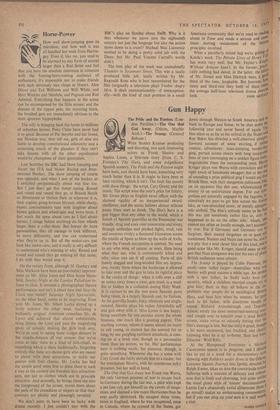Gun Happy
The Pride and the Passion. (Lon- don Pavilion.)—The One that Got Away. (Odeon, Marble Arch.)—The Scamp. (General Release.)
WITH Stanley Kramer producing and directing, two such interesting actors as Frank Sinatra and
Sophia Loren, a first-rate story (from C. S. Forester's The Gun), •and some magnificent Spanish scenery, 7'he Pride and the Passion might have been, and should have been, something very much better than it is. It ought to have been at
least exciting, which it isn't. The fault lies mainly with three things: the script, Cary Grant, and the music. The script wins the year's prize for fatuity, Mr. Grant plays an English naval officer with the alarmed rigidity of an inexperienced sword- swallower, and the music bellows almost without
pause from start to finish. The film's hero is a gun bigger than any other in the world, which a bunch of Spanish guerrillas in the Peninsular war trundle, drag and coax over mountains and rivers, through ambushes and pitched fights, mud, rain and amorous rivalry a thousand kilometres across the middle of Spain to blow up the walls of Avila, where the French occupation is centred. No need to say who wins, of course, or even, films being what they are, who is conveniently killed and why, since you see it all coming. Parts of this mostly dogged and long-winded film are impres- sive, mostly those where the landscape is allowed to take over and the gun to take its rightful place in the centre of things: when it rolls over a cliff or swims away down a river, gets stuck in a mud- flat or hidden in a cathedral during Holy Week. It is curious to see the two main Spanish parts being taken, in a largely Spanish cast, by Italians. As the guerrilla leader, foxy, obstinate and single- minded, Sinatra plays his rather formidable self and gets away with it. Miss Loren is less happy, being somehow far too anxious about the whole business, too much like a pouting pigeon. This startling woman, whom it seems almost an insult to call young, so mature has she seemed for so long, by our gangling northern standards, is com- ing on at a brisk rate, though as a personality more than an actress, so far. Her performance here is nothing much; her presence, though, is quite something. Whenever she has a scene with Cary Grant she fairly shrivels him to a cinder; but the nonchalant Sinatra, with his murderous sulky 'presence, has her well in hand.
The One that Got Away was Franz von Werra, the only German prisoner of war to escape back to Germany during the last War, a pilot who kept a pet lion cub, got himself on the covers of maga- zines, and claimed a few more Hurricanes than he ever really destroyed. He escaped three times, twice in England, where he Was recaptured, once in Canada, where he crossed to the States, got down through Mexico to South America ands° back to Europe and home; to be shot down hi,e following year and never heard of again. 111,e film takes us as far as his arrival in the States anu Roy Baker has directed a well-observed straight' forward account of some exciting, if rather routine, adventures: train-jumping, tunnel'ig,• ging, pursuit across moors with long inexorable lines of men converging on a sodden figure indfr tinguishable from the surrounding mud. Hart" Kruger plays von Werra with conviction and the right touch of handsome swagger; but at the risk, of sounding a prize political prig I would say the' British films, with their dangerous politeness, cis"' on an occasion like this one, whitewashing the enemy to an unfortunate degree. For our sYre. pathies are naturally engaged by the fugitive, stinctively we pant to get him across the frozen lake, or rain-drenched moor, or merelyantagee; istic airfield. The film's attitude seems to be the' this was just somebody rather like us. onlY hc happened to be on the other side : which. one cannot say often or loudly enough, isn't necessar' fly true. For if Germany and Germans can be, forgiven, their record forgotten or at least 0' mentioned, Nazism and Nazis can never be, and it is a pity that a neat clever film of this kind, and 3 good actor like Mr. Kruger, should seem to sag,: gest that Nazi arrogance was just the sort of Pia° British audiences most admire. The Scamp is played by Colin Petersen, thc small—now rather larger—Australian who `,"'e5 Smiley with great success a while ago. An urchin with a spiv father, he badly lacks love and security, which a childless married couple try lc) give him; then, as they all behave in the probable way people do in sociological Britisu films, and beat him when he sneezes, he geeisi back to his father, with disastrous results al round. Richard Attenborough and DorothY Alison, surely the most unmarried-seeming Mar,- ried couple ever to cohabit even a staid Brit's" screen, make virtue so odiously boring that thhe film's message is lost. But the child is good, thollg,': a bit more mannered, less freckled, and clear') knowing what he is up to•better, than last tinic. Director : Wolf Rilla. At the Hampstead Everyman a Michael Cacoyannis season is in progress; and I should, like to put in a word for a documentary nd''' showing with Robbery under Arms at the Ode°9' Leicester Square. Journey into Spring, directed bc)11 Ralph Keene, takes us into the countryside fowl Selborne with a mixture of delicacy and robust- ness that is fresh and charming, and quite unlike the usual prosy style of 'nature' documentaries; Laurie Lee's obsessively awful alliteration (here / go myself) makes an embarrassing commentarY; but if you can plug up your ears it is well worth a visit
ISABEL QUIGLY


































 Previous page
Previous page